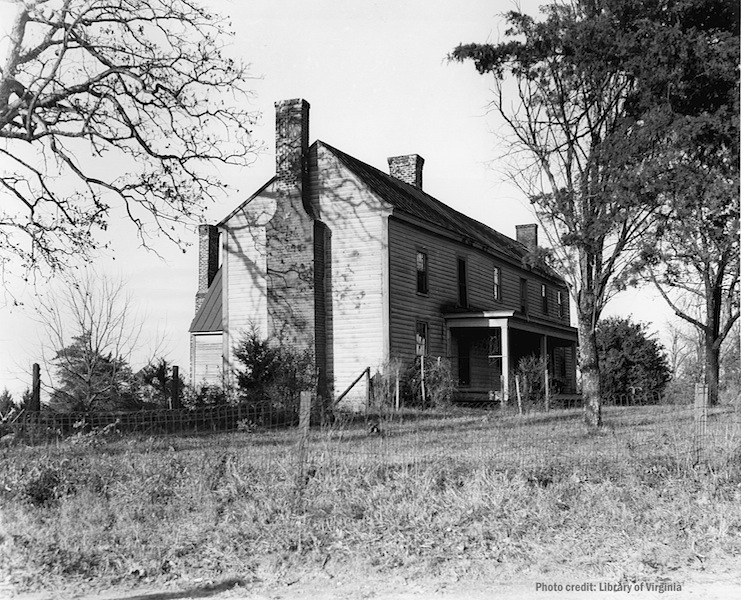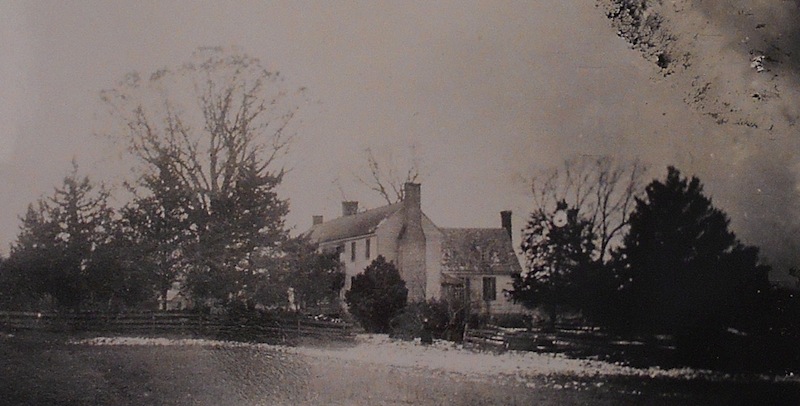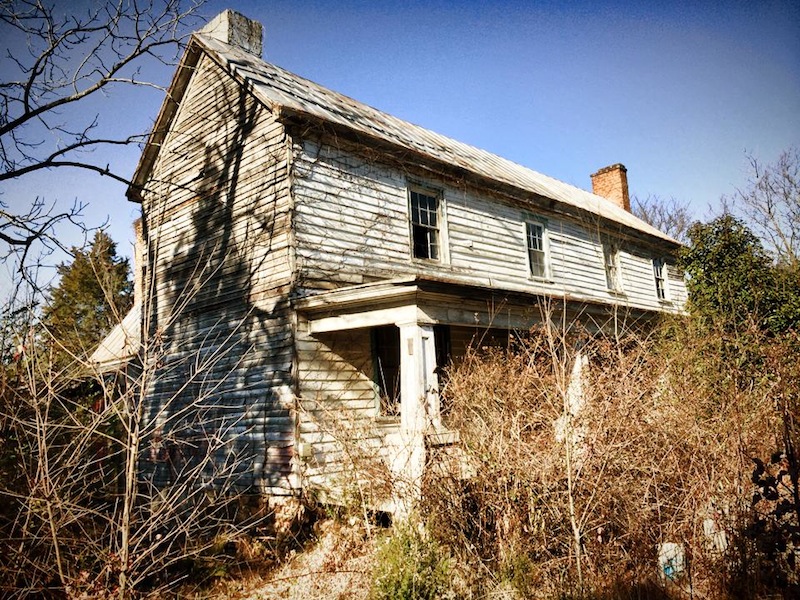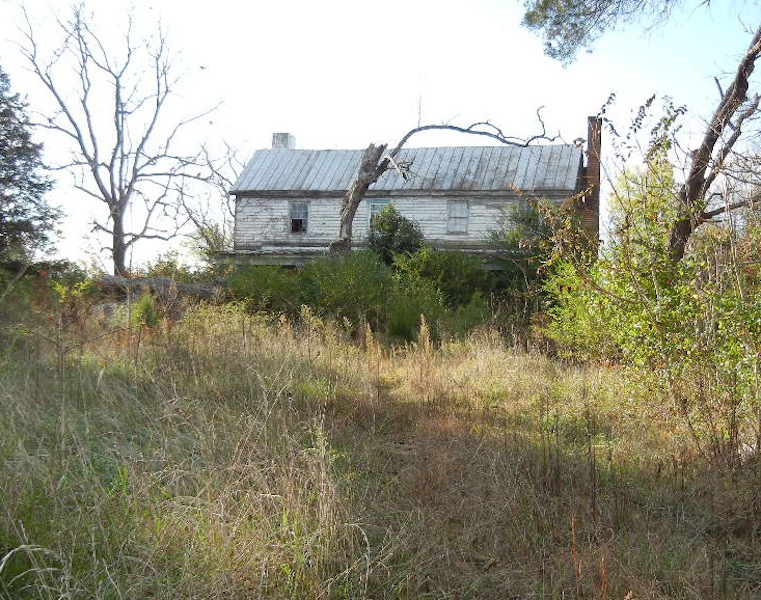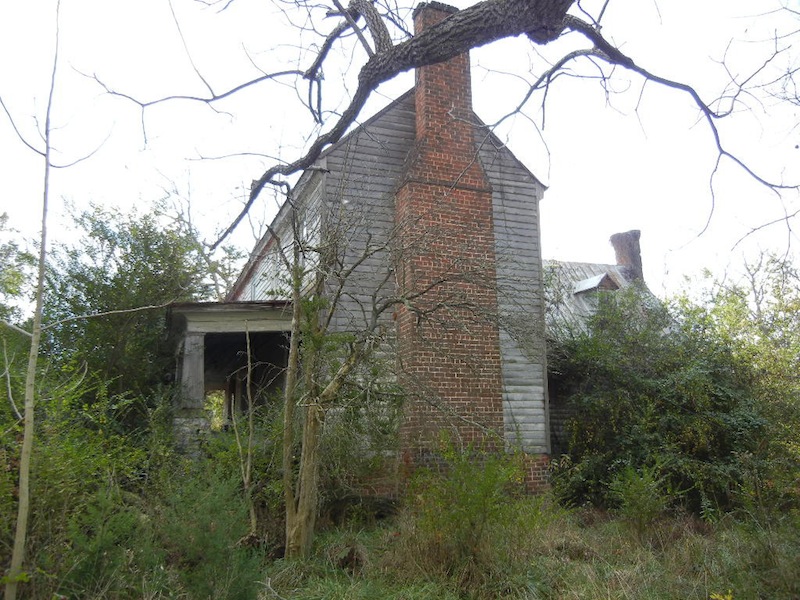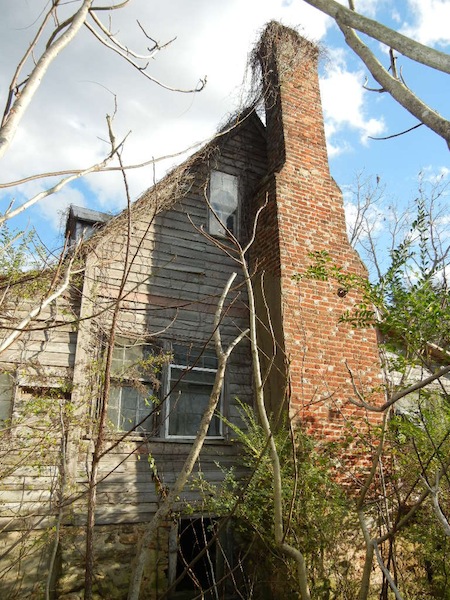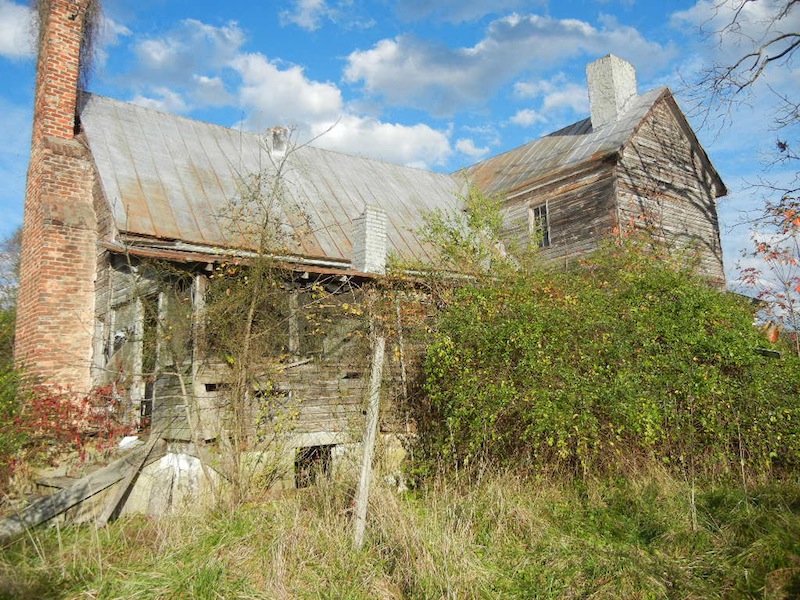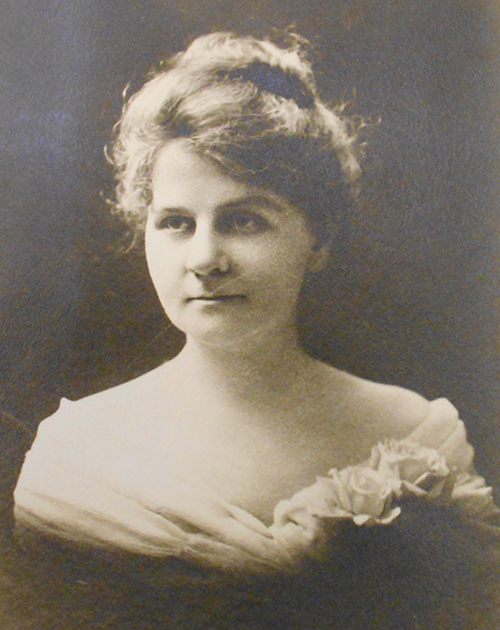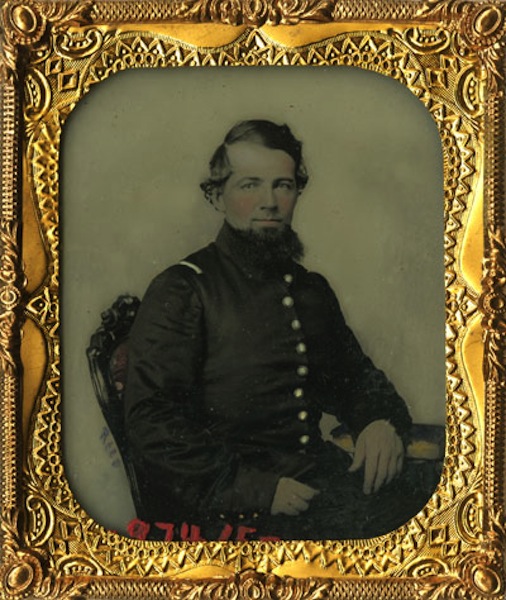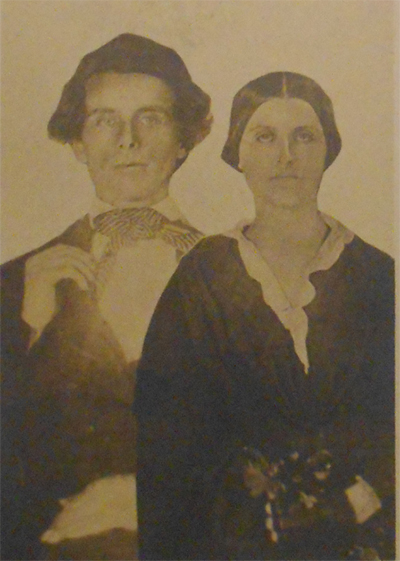Lombardy Grove Tavern
4764 Plank Rd. (approximate), South Hill, VA; Near intersection of Union Level Road and Plank Road, South Hill, VA
Hours:
Private property, not open to the public
The community of Lombardy Grove appears on Madison's Map of Virginia dated 1818 and may have originated around the extensive plantation of that name, belonging to William Baskervill, Senior, clerk of court for Mecklenburg County, 1784-1814. His operation, which was about one mile south of Union Level Road, included a tannery, blacksmith shop, an ordinary, and a log store that also housed a post office established in 1807. Advertisements, maps, letters, and diaries indicate that Lombardy Grove was a busy community in the nineteenth century prominently located on major thoroughfares of the nineteenth century.
Hours:
Private property, not open to the public
Located approximately one-half mile north of Baskervill's home at the intersection of present day Union Level Road and Plank Road, was another plantation complex owned by Richard Apperson (????-1826). In 1828 William Jones purchased from the estate of Richard Apperson 504 acres that included "a valuable manufacturing Mill ... a Tavern and Store House on one of the most public roads in this part of the country ...," and 374 acres on the west side of Miles Creek. Jones was apparently living on the site prior to his purchase, possibly as the operator, according to an advertisement dated October 17, 1826 that stated "Mr. William Jones, living on the land, will show it to any person who will call on him." Mr. Jones was granted an ordinary license in 1828. At some point after his purchase the post office was relocated from the store at Baskervill's to the store on the Jones property.
The mill, which appears as Jones' Mill on the 1864 Confederate Engineers Map, was located a short distance west of the tavern, near the present-day Lake Gordon Department of Game and Inland Fisheries boat launch at the intersection of Union Level and Gordon Lake Roads.
Taverns, or ordinaries as they were also called, were central to eighteenth and nineteenth century life. In addition to offering overnight accommodations and refreshment, Lombardy Grove Tavern was the site of public gatherings, elections, and the post office. In 1855, the ordinary became a stage stop on the Boydton-Petersburg Plank Road. During the war years it served as a soldier enlistment location, and as a salt dispersal site. Salt was an enormously important commodity prior to modern refrigeration capabilities. The Confederate government permitted only twenty pounds per household and consequently assigned disbursement to selected agents and locations. In May 1862, Mecklenburg's agent, J. J. Daly, selected Lombardy Grove as one of three official disbursement sites in the county; the others were located at Boydton and Clarksville.
On May 14, 1861, after leaving Boydton with a great deal of fanfare including dinner at the Boydton Hotel, the Boydton Cavalry (Co. E/later Co. A, 3rd Virginia Cavalry) spent its first night encamped at Lombardy Grove. From there they proceeded up the Boydton-Petersburg Plank Road toward their destination -- the camp of instruction at Ashland. As they rode, the citizenry, especially the female portion, turned out to see them. Theresa A. Hutcheson of Oak Level wrote Mrs. Sallie G. Phillips of Boydton that she had seen:
"the Cavalry from Boydton pass last Wednesday morning and I do assure you it was the most solemn and awful sight I ever witnessed and it was a fine looking company I do assure you the Captain Tom Goode was decidedly the most handsome man my eyes ever flashed on ..."
The Lombardy Grove Tavern located here was operated by William Jones from about the early 1800s until his death in 1859, then by his son, Joseph H., to 1863. "J. Jones" is shown as living adjacent to the tavern on the 1864 Confederate Engineers' map. In the June 13, 1863 issue of the Richmond Examiner newspaper, Joseph H. Jones placed an ad for a "Female Teacher ... to take charge of a small school in his family ... Location as healthy, pleasant and safe from the Yankees as any in the State ..."
In 1864 Joseph Jones placed a notice in the Richmond Enquirer seeking information on his son, William H. Jones, a private in the Boydton Cavalry:
"Mecklenburg county, Va, Sept 2, 1864. Information wanted of Private W H Jones, company A, 3d Virginia cavalry, Wickham's brigade, Fitz Lee's division, who was taken prisoner on the 16th of August, near Front Royal, Va. Any information concerning him will be thankfully received.
Joseph H. Jones,
Lombardy Grove, Mecklenburg co, Va.
New York Daily News and Baltimore papers please copy."
Private Jones had been sent first to Washington, D.C., and then to prison in Elmira, New York. He was later paroled.
At some time in 1863 Harwood A. Lockett (1812-1895) became the tavern operator; and by 1869 he had purchased the property -- tavern, mill, and store. Originally the tavern building was a one-and-a-half story structure. Mr. Lockett, wanting to give it the air of a hotel, had it remodeled and enlarged with a six bay (window) wide, two-story addition fronting on the Boydton Plank Road as evidenced in the Works Process/Projects Administration (WPA) photos from the 1930s. Current photos show that post 1930 a portion of the front was removed and the porch remodeled.
Lockett was the father of Myrta Lockett Avary (1857-1946), author of A Virginia Girl in the Civil War (1903) and Dixie After the War (1906), among many others. Margaret Mitchell is reputed to have said that she could not have written Gone With the Wind without the influence of Avary's books. Avary dedicated the latter book to her brother Philip Lockett (1842-1899), First Lieutenant, Company G (Chambliss Grays), 14th Virginia Infantry, Armistead's Brigade, Pickett's Division, C.S.A. He had entered the Confederate Army as a lad, enlisting as a private at Lombardy Grove, and was in Pickett's immortal charge at Gettysburg, where he was taken prisoner of war, and later exchanged. After being wounded in the neck and shoulder at Bermuda Hundred, Virginia, he received a forty-day furlough and went home. Later he was at Appomattox Court House when General Robert E. Lee surrendered. He returned home to Lombardy Grove briefly serving as postmaster (1872-1873) and later practicing law.
Myrta Locket Avary also painted a picture of the Mecklenburg County post-war years in her memoirs written for her nephew in 1941. In her account of the reception held at Lombardy Grove in 1868 to celebrate the wedding of her brother, John, and Lucy Baskerville, she described a table laden with "meats and sweets." There was the "classic 'Pig with Apple in his Mouth'" along with a decorated ham of "great antiquity" that had been "buried so well that Sheridan's raiders had failed to find it. 'Sweet as sugar' and 'crumbles in your mouth,' [was] said by those nibbling wafer thin slices. Truly a lordly dish." Despite the gaiety of the described event, she notes her parents must have wanted to do more for the eldest son: "If age and poverty had not eventually broken them. No, not so much age and poverty. But the War, war that kills sweetness and beauty."
While Mecklenburg County was not at the center of the fighting, the local population was suffering: With most of the able-bodied men absent, those left behind struggled to plant and harvest and feed their families. Relief in the form of much needed food was offered to soldiers' families through the "Soldier's Family Fund." H.A. Lockett was one of the commissioners who implemented this program locally.
The Lockett family owned Lombardy Grove until 1892. The March 30, 1871 issue of the Alexandria Gazette contained the wedding announcement for Joseph Lockett's daughter, Annie, to General J. D. Imboden, which took place March 15, 1871 at her father's residence, Lombardy Grove. While a captain in the Virginia State Militia, Imboden commanded an artillery battery at the First Battle of Bull Run. In 1862 he left the artillery to recruit a battalion of partisan rangers and was promoted to colonel of the 62nd Virginia Mounted Infantry (1st Partisan Rangers). Promoted to brigadier general in 1863 he fought in the Gettysburg and Valley Campaigns. Annie was the general's fourth wife; she predeceased him in 1888.
Contributors: Carol Corker, Mecklenburg County Civil War Sesquicentennial Committee & Leigh Lambert, Director of Southside Regional Library
Websites:
http://rmccivilwar.blogspot.com/2012/04/philip-lockett-student-1859-1861.html
http://www.findagrave.com/cgi-bin/fg.cgi?page=gr&GRid=112785948
Sources:
Full Sources for Historic Sites [pdf]
http://rmccivilwar.blogspot.com/2012/04/philip-lockett-student-1859-1861.html
http://www.findagrave.com/cgi-bin/fg.cgi?page=gr&GRid=112785948
Sources:
Full Sources for Historic Sites [pdf]
(c) Copyright 2014. All Rights Reserved. Designed by Jason Winter ||
